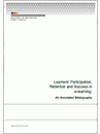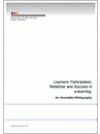This report gives an overview of the literature on tertiary learners’ participation, retention and success in e-learning. We selected a large selection of research literature which consisted of both published research from journals, books and the internet and ‘grey’ literature that included project reports, unpublished theses and dissertations and reports commissioned by government agencies.
Key Results
- Teaching practices and pedagogies, institutional support and student characteristics and attitudes are all critical in tertiary learners’ retention and success in e-learning. Of particular importance are appropriate teacher-student interactions. Courses need to be designed to incorporate e-learning’s strengths. This includes selecting appropriate technology and ensuring that e-learning is linked to assessments and authentic learning experiences.
- For best results, institutions need to provide ‘user-friendly’ systems, processes and appropriate pastoral and technical support. Students also need motivation, self-direction and independence as well as having prior experience in e-learning. Students with positive attitudes towards technology tend to do better in e-learning than learners with negative attitudes towards technology.
- E-learning provides additional flexibility to traditional delivery by allowing students to study at a time, place and pace of their choosing. E-learning can also reduce isolation by better connecting learners to their peers, teachers and institutions – especially for learners studying part-time or through distance education.
- E-learning can provide greater access to a wider range of resources and experts than is available through traditional delivery. The fact that all students can equally access these experts and resources is of benefit to non-mainstream learner groups e.g. disabled students.
- The evidence supporting younger learners being more successful than their older peers in e-learning is inconclusive. While some studies support the assertion that younger learners are more effective in e-learning, others do not.


